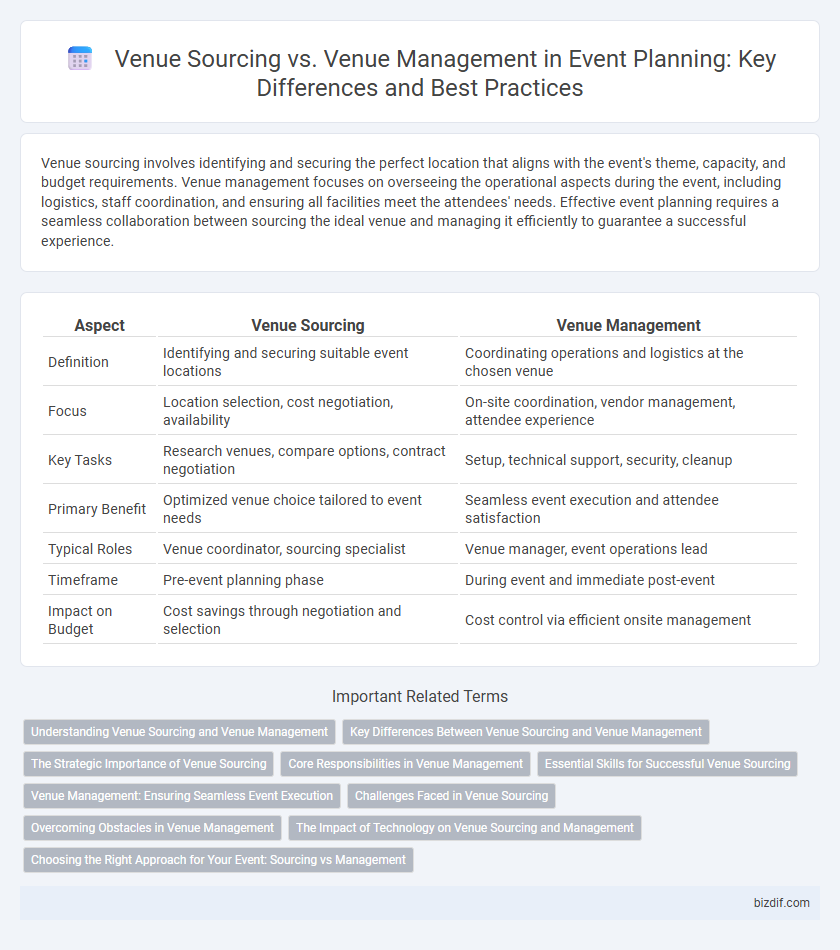Venue sourcing involves identifying and securing the perfect location that aligns with the event's theme, capacity, and budget requirements. Venue management focuses on overseeing the operational aspects during the event, including logistics, staff coordination, and ensuring all facilities meet the attendees' needs. Effective event planning requires a seamless collaboration between sourcing the ideal venue and managing it efficiently to guarantee a successful experience.
Table of Comparison
| Aspect | Venue Sourcing | Venue Management |
|---|---|---|
| Definition | Identifying and securing suitable event locations | Coordinating operations and logistics at the chosen venue |
| Focus | Location selection, cost negotiation, availability | On-site coordination, vendor management, attendee experience |
| Key Tasks | Research venues, compare options, contract negotiation | Setup, technical support, security, cleanup |
| Primary Benefit | Optimized venue choice tailored to event needs | Seamless event execution and attendee satisfaction |
| Typical Roles | Venue coordinator, sourcing specialist | Venue manager, event operations lead |
| Timeframe | Pre-event planning phase | During event and immediate post-event |
| Impact on Budget | Cost savings through negotiation and selection | Cost control via efficient onsite management |
Understanding Venue Sourcing and Venue Management
Venue sourcing involves identifying and securing the ideal location for an event, emphasizing factors like capacity, cost, accessibility, and ambiance to meet client requirements. Venue management encompasses the ongoing coordination and supervision of the venue's operations during the event, including logistics, technical support, and vendor communication to ensure a seamless experience. Understanding both processes is crucial for successful event execution, as sourcing selects the setting while management ensures effective utilization and guest satisfaction.
Key Differences Between Venue Sourcing and Venue Management
Venue sourcing involves researching, identifying, and selecting the ideal location based on event requirements, budget, and capacity, while venue management focuses on the operational aspects such as coordinating logistics, vendor collaboration, and on-site execution. Key differences include the scope of responsibilities: venue sourcing is primarily a pre-event activity centered around location selection, whereas venue management covers comprehensive event day execution and troubleshooting. Effective venue sourcing ensures the right space is chosen, and proficient venue management guarantees seamless event delivery and attendee satisfaction.
The Strategic Importance of Venue Sourcing
Venue sourcing plays a strategic role in event planning by ensuring the selection of locations that align with an event's objectives, budget, and attendee experience. Efficient venue sourcing leverages market analysis, supplier relationships, and logistical considerations to optimize cost-efficiency and operational success. This approach impacts overall event quality by securing venues that enhance brand presence and attendee satisfaction.
Core Responsibilities in Venue Management
Venue management focuses on coordinating onsite logistics, ensuring seamless event execution, and overseeing vendor relationships during the event lifecycle. Core responsibilities include facility maintenance, staffing coordination, compliance with safety regulations, and managing equipment setup and teardown. Effective venue management ensures a controlled environment that enhances attendee experience and supports event objectives.
Essential Skills for Successful Venue Sourcing
Successful venue sourcing requires strong negotiation skills to secure optimal contracts and favorable rates with venue providers. Expertise in market research and vendor evaluation enables event planners to identify venues that align with event objectives, capacity needs, and budget constraints. Proficiency in logistical planning ensures seamless coordination of site inspections, availability checks, and compliance with event-specific requirements.
Venue Management: Ensuring Seamless Event Execution
Venue management involves coordinating logistics, vendor relationships, and staff to ensure smooth event execution, optimizing guest experience and operational efficiency. It encompasses on-site supervision, troubleshooting, and adherence to safety protocols to prevent disruptions. Effective venue management directly influences event success by maintaining schedule integrity and facilitating seamless communication among all stakeholders.
Challenges Faced in Venue Sourcing
Venue sourcing involves identifying and securing the ideal location that aligns with event objectives, which presents challenges such as limited availability, budget constraints, and varying venue capabilities. Event planners must navigate complex negotiations, ensure compliance with local regulations, and assess logistical factors like accessibility, technological infrastructure, and capacity limits. The unpredictability of demand fluctuations and competition for popular venues further complicate scheduling and contract agreements.
Overcoming Obstacles in Venue Management
Venue sourcing involves identifying and securing the ideal location for events, while venue management focuses on coordinating logistics, staff, and services during the event. Overcoming obstacles in venue management requires proactive communication with vendors, efficient scheduling, and real-time problem-solving to handle unexpected issues such as technical failures or staffing shortages. Implementing comprehensive contingency plans and leveraging event management software enhances the ability to adapt swiftly and maintain seamless event operations.
The Impact of Technology on Venue Sourcing and Management
Technology has revolutionized venue sourcing by enabling event planners to access extensive online databases, virtual tours, and real-time availability, significantly streamlining the selection process. Advanced management software integrates booking, logistics, and communication, enhancing operational efficiency and minimizing errors during event execution. Data analytics and AI-driven tools provide predictive insights and personalized recommendations, optimizing both sourcing decisions and venue management strategies.
Choosing the Right Approach for Your Event: Sourcing vs Management
Choosing the right approach for your event depends on whether you prioritize customizing the venue or streamlining operations. Venue sourcing focuses on finding the perfect location that aligns with event goals, budget, and guest experience requirements. Venue management emphasizes overseeing logistics, staff coordination, and on-site execution to ensure seamless event delivery.
Venue sourcing vs Venue management Infographic

 bizdif.com
bizdif.com